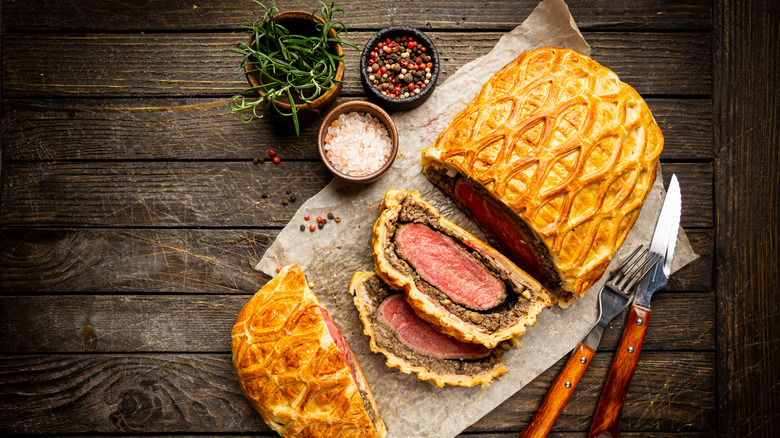Where Did Beef Wellington Get Its Name?
There's probably no more iconic British dish than Beef Wellington. A log of beef tenderloin surrounded by pate and mushroom duxelles, coated in puff pastry and baked until crispy on the outside (but with a perfect medium rare on the inside). What's not to love? There's a reason it's one of the most iconic dishes of all time. And how about that name? Any student of 19th-century history can probably hazard a guess as to where it came from. It must've been named after Arthur Wellesley, the Duke of Wellington, the man who famously defeated Napoleon at the Battle of Waterloo in 1815, right? Well... maybe?
The truth is, we don't know for sure about the origins of Beef Wellington's name. It could very well have been named after Wellesley, but there's no concrete evidence one way or another. There sure are a lot of theories, but the history of Beef Wellington is so foggy that not only do we not know for sure who it's named after, but we don't even know specifically when it was invented.
Beef Wellington's origins are all over the place
It's hard to figure out the origins of many popular foods, and there are a lot of apocryphal stories out there, like that one about potato chips you've probably heard. Logically, this one seems like it should be a slam dunk. It's a British food named "Wellington" that originated in the 19th century, during a time when Arthur Wellesley, the First Duke of Wellington, was one of Britain's greatest national heroes. (Although, funnily enough, he was actually from Ireland). The dish being named after him makes the most sense. And that could've been what happened, but we don't know for sure.
First off, calling it a "19th-century dish" is a little dubious. The first written reference to Beef Wellington occurs in 1899 in a Hamburg-America shipping line menu, after which the next reference is from a Los Angeles Times article from 1903. Meanwhile, the first recipe doesn't appear until as late as 1940. Strangely, these early references were almost all connected to America, and its antecedent could very well be a French dish called "filet de boeuf en croûte." It was adopted by the British at some point during the intervening years, but exactly when is hard to trace.
Secondly, there isn't any concrete evidence connecting it to the Duke of Wellington himself. There are all sorts of stories, but there's nothing definitive. And food historians have definitely looked.
There are tons of theories about the name
For the sake of argument, let's assume the dish was named after Arthur Wellesley. Even if there's no verifiable proof, there's a reason most food historians accept that the Beef Wellington was probably named after the famous guy with the same name. If that's the case, why was it called that?
Here's where there are many more historical theories, all of them based on conjecture. One posits that it was named after the Duke of Wellington because he preferred food that could be eaten on the march, and Beef Wellington is pretty portable. Another is that Wellington wasn't a picky eater, so his chef made a lot of Beef Wellingtons because the chef just liked making them. A third is that the dish really is just the French dish that came before it, but its name was changed due to ongoing conflict with France, especially during the Napoleonic Wars. (This would make it the 19th-century version of "freedom fries.") Another theory is that it isn't named after Wellington but got the name because it looks like a Wellington boot, a piece of rainwear worn by the very same Duke of Wellington. (So, we're still on Arthur Wellesley. regardless.)
Again, we don't know for sure. Any of these stories could be true — or none of them. All we really know is that Beef Wellington is tasty!


